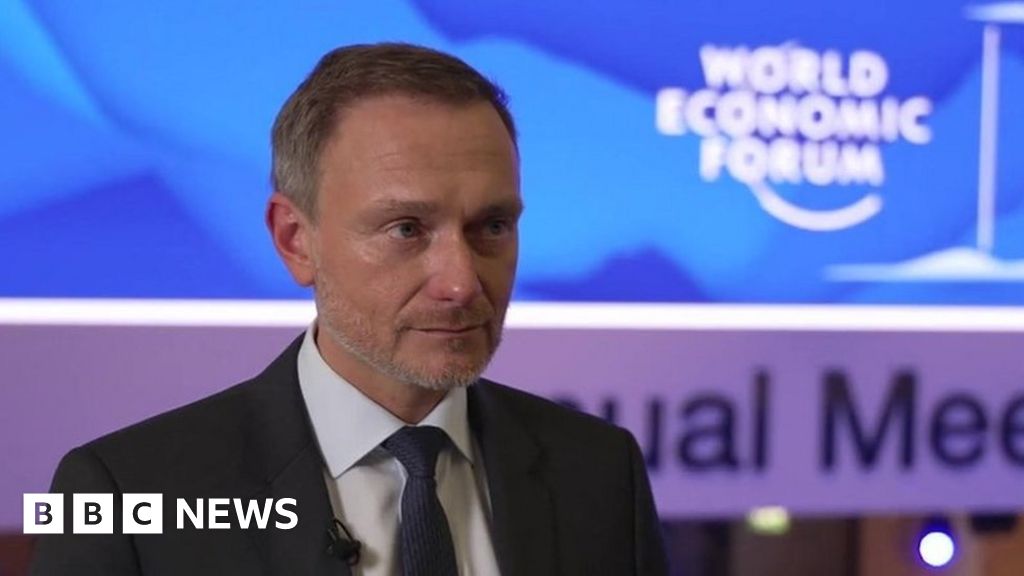Germany Says It Is No Longer Reliant On Russian Energy

Germany's Finance Minister, Christian Lindner, says his country no longer imports energy directly from Russia
Germany no longer depends on Russian imports for its energy supply, the country's finance minister has told the BBC.
Christian Lindner said Germany had completely diversified its energy infrastructure since Russia's invasion of Ukraine last year.
Following the invasion, Russia turned off the gas taps to Europe, leading to fears of blackouts this winter.
But Germany had found new sources of energy, Mr Lindner said.
"Yes, of course Germany is still dependent on energy imports, but today, not from Russian imports but from global markets," he said.
Germany previously imported around half of its gas from Russia and more than a third of its oil.
But Russia cut off the country's gas supply in August, while Germany halted Russian oil imports at the start of the year.
In its race to find alternate sources of energy, the country has reopened coal-fired power plants, delayed plans to shut down its three remaining nuclear power plants, and pushed to increase capacity to store natural gas imported from other countries such as Norway and the US.
At the World Economic Forum (WEF) in Davos, Switzerland, Mr Lindner pointed to the speed with which a new liquefied natural gas terminal had been built in Germany - in a record of around eight months, he said. More infrastructure investments were planned, he added.
"This is only [one] example of the enormous change in German policies," he said.
"We have understood that we have to foster our competitiveness after the era of Chancellor [Angela] Merkel. That era was focused on, well, strengths of the past, and now we are developing strengths of the future," he said.
Green trade war
Mr Lindner struck an optimistic note, suggesting there was "some evidence" that inflation in Germany had reached its peak last year.
"Probably there's a faster recovery of the global economy and European economies than expected," he said.
However, potential for a damaging trade row between the EU and the US over green subsidies remains.
The US last year approved a massive $370bn (£299bn) in investments for climate-friendly technologies, including tax credits for electric cars that are made in America.
However, the law includes some "made in America" rules, which have raised concerns in Europe that businesses outside the US will be put at a disadvantage.
In a visit to Washington last month, French president Emmanuel Macron criticised the US rules as "super aggressive".
Mr Lindner said he did not want to see the European Union start a trade war with the US over those rules.
'Must not happen'
"We have to avoid any kind of competition - who is able to pay more subsidies," he said. "It mustn't happen."
Mr Lindner's comments signal the challenges that lie ahead as Europe tries to develop a response to the US climate law, which is officially called the Inflation Reduction Act.
France has proposed responding with rival "buy European" incentives, and European Union officials this week also promised "decisive" steps.
Mr Lindner said maintaining a level playing field was important, but he wanted to see the two sides negotiate exemptions for companies or develop a new trade deal, rather than try to out-subsidise each other.
"There is a threat for the level playing field and I take this seriously but... we are spending and investing much more than the US-side so we don't have to be afraid," he said.
"Some in the European context, they see the Inflation Reduction Act as the occasion to introduce policies they've proposed in the past, and I think it is an occasion to strengthen our competitiveness at the European level, make further progress on capital markets union, to negotiate with the US side a free trade agreement - but not pay more subsidies," he said.
Unlike the big French car companies, many German firms already have a big presence in the US, including manufacturing plants.
The "made in America" rules have prompted a pushback even from some American companies, many of which rely on parts manufactured in other countries.
From Chip War To Cloud War: The Next Frontier In Global Tech Competition
The global chip war, characterized by intense competition among nations and corporations for supremacy in semiconductor ... Read more
The High Stakes Of Tech Regulation: Security Risks And Market Dynamics
The influence of tech giants in the global economy continues to grow, raising crucial questions about how to balance sec... Read more
The Tyranny Of Instagram Interiors: Why It's Time To Break Free From Algorithm-Driven Aesthetics
Instagram has become a dominant force in shaping interior design trends, offering a seemingly endless stream of inspirat... Read more
The Data Crunch In AI: Strategies For Sustainability
Exploring solutions to the imminent exhaustion of internet data for AI training.As the artificial intelligence (AI) indu... Read more
Google Abandons Four-Year Effort To Remove Cookies From Chrome Browser
After four years of dedicated effort, Google has decided to abandon its plan to remove third-party cookies from its Chro... Read more
LinkedIn Embraces AI And Gamification To Drive User Engagement And Revenue
In an effort to tackle slowing revenue growth and enhance user engagement, LinkedIn is turning to artificial intelligenc... Read more

